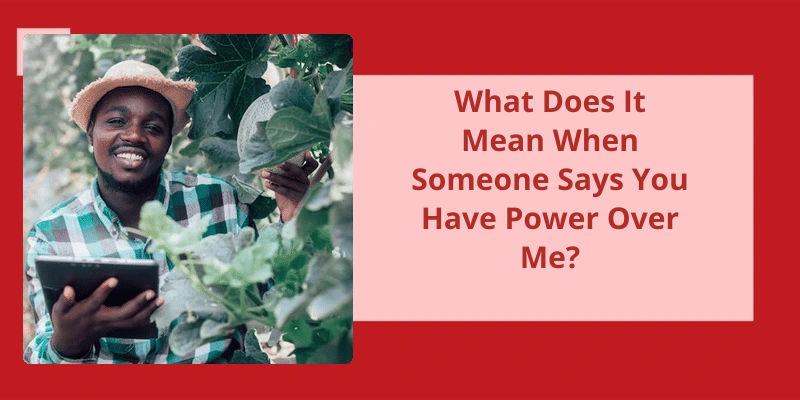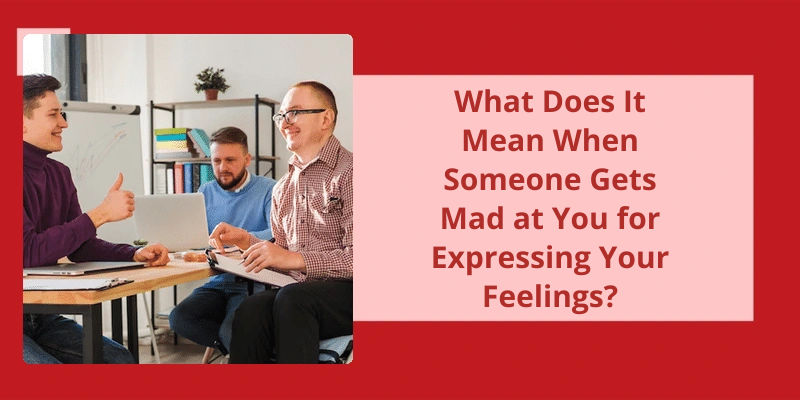Have you ever been in a situation where someone tells you that you’ve power over them? It's not as sinister as it sounds. In fact, it can be quite a positive thing. When someone says they’re under your control, it means they respect and value your opinions and decisions. They trust you to make the right choices for them, and they believe that you’ve their best interests at heart. It's a powerful feeling to know that you’ve the ability to positively influence someone's thoughts and actions. This type of power is borne of trust, empathy, and a deep connection with the other person. So when someone tells you that you’ve power over them, embrace it and use it to make a positive impact on their lives.
What Does Power Over You Mean?
In todays society, power over has become a complex issue, as it can be exerted in various ways. Factors such as race, gender, social class, wealth, and access to resources all play a role in who’s power over whom. For example, those who hold positions of authority, such as government officials, employers, and police officers, often have power over those who’re subordinate to them. This can lead to a sense of control that can be abusive if not kept in check.
Power over can also take the form of manipulation, which can be particularly insidious. People who’re skilled at manipulating others can use their words, body language, and behavior to make others do what they want. This type of power can be used in personal and professional relationships, and it can be difficult to identify when it’s being used.
In many cases, power over is used to maintain the status quo. Those who’ve power over others may take steps to ensure that they continue to hold that power, such as by controlling access to education or job opportunities. This can create a situation where certain groups are prevented from advancing, leading to a sense of hopelessness and frustration.
The impact of power over can be significant. For those who’re on the receiving end of it, it can create feelings of helplessness, anger, and resentment. It can lead to depression, anxiety, and other mental health issues. It’s important, therefore, for those who’ve power to use it responsibly and to be aware of the impact their actions have on others.
Ultimately, power over isn’t something that can be eliminated entirely. There will always be those who hold more power than others, whether due to their position in society or their personal qualities. However, it’s possible to create a more equitable society, where power is shared and where those who hold it use it for the benefit of all. This requires a commitment to social justice, and a willingness to listen to the voices of those who’re often marginalized and oppressed. Only then can we create a world where power isn’t used to control, but to uplift and empower.
The Effects of Power Over in Interpersonal Relationships, Such as Parent-Child Relationships or Romantic Relationships
- Loss of trust
- Insecurity and fear
- Imbalance of power dynamics
- Manipulation and control
- Abuse of authority
- Isolation and withdrawal from relationships
- Low self-esteem and self-worth
- Lack of communication and understanding
- Reduced intimacy and emotional connection
- Difficulty in resolving conflicts
Understanding the idea of not giving your power away can be a powerful tool in taking control of your own life. By recognizing the signs of giving your power away, you can start to reclaim your own thoughts and feelings and take charge of your own life. In the next section, we’ll explore some strategies to help you take back control and regain your power.
What Does It Mean to Not Give Your Power Away?
This can lead to a lack of self-confidence and self-esteem, as well as a feeling of inadequacy and doubt. When you give your power away, you become a victim of circumstance rather than the master of your own fate. You allow external factors to control your happiness and well-being.
You recognize that you’re in control of your own reactions and responses, and you make a conscious effort to choose how you respond to difficult situations. Instead of sulking or feeling defeated, you take positive action to address the issue at hand.
In order to not give your power away, it’s important to practice self-awareness and self-reflection. This means taking time to understand your own needs, values, and beliefs, and staying true to them even when it’s difficult. It also means being honest with yourself about your strengths and weaknesses, and not being afraid to ask for help when you need it.
Finally, not giving your power away means setting healthy boundaries. This means recognizing when someone or something isn’t serving you, and making a conscious decision to distance yourself from it. It also means being assertive when necessary, and standing up for yourself and your beliefs.
It means having the confidence to trust yourself and the resilience to navigate difficult situations. By practicing self-awareness, self-reflection, and setting healthy boundaries, you can cultivate a sense of empowerment and live a more fulfilling, satisfying life.
The Negative Impacts of Giving Your Power Away in Personal Relationships
It’s been observed that giving your power away in personal relationships often leads to negative consequences. This is because, when you give away your power, you allow the other person to take control of the relationship and make decisions for you. This can lead to feelings of helplessness, lack of self-worth, and resentment towards the other person. It’s important to maintain your power and autonomy in personal relationships to ensure that your needs, desires, and boundaries are respected and fulfilled.
Having power over your life means taking control of your actions and decisions. It means having the ability to shape your own destiny, rather than being at the mercy of external circumstances or other people’s whims. Personal power is a crucial aspect of this, as it empowers individuals to assert their own agency, creativity, and resilience in navigating life’s challenges. In the following sections, we will explore different ways to cultivate personal power and take charge of your life.
What Does It Mean to Have Power Over Your Life?
Having power over your life means that you’re in control, or at least have the ability to control, your own decisions and actions. It means being self-reliant, taking charge of your thoughts and emotions, and not allowing external factors to control your fate.
One of the key components of having power over your life is self-awareness. You must have a clear understanding of who you are, your strengths and weaknesses, and what you want out of life. When you’re aware of your own needs and desires, you’re better equipped to make choices that align with your values and goals.
Another important factor in having power over your life is resilience. Life can throw us curveballs, and it’s how we respond to those challenges that determine our level of power. When you’re resilient, you bounce back from setbacks and use them as learning experiences to grow stronger. You don’t let failures define you, but instead view them as opportunities for growth and development.
Negative thoughts and beliefs can rob us of our power and hold us back from achieving our goals. By cultivating a positive mindset, focusing on what you can control, and taking action towards your goals, you can create a self-fulfilling prophecy that leads to success and happiness.
How to Develop Self-Awareness: Tips and Strategies
Self-awareness is the ability to be conscious of your own thoughts, feelings, and behaviors. To develop self-awareness, it’s important to spend time reflecting on your actions and emotions, seeking feedback from others, and engaging in mindfulness practices. These tips and strategies can help you better understand yourself and make positive changes in your life.
Understanding the difference between power and authority is crucial in various real-life situations, including workplaces, government organizations, and households. While power is often associated with individuals’ personal traits and characteristics, authority is granted by a higher entity and must be adhered to. In the following sections, we will explore some practical examples of power and authority and identify the challenges people face in navigating these dynamics.
What Is Power and Authority in Real Life Examples?
In real life, power and authority often go hand in hand. However, there are instances where individuals may have power but not authority, or authority but not power. For example, a police officer may have the authority to make an arrest but may not have the physical power to do so alone. Similarly, a celebrity may have the power to persuade their followers to take certain actions, but they don’t necessarily have the authority to make binding decisions.
In politics, power and authority are often intertwined. Elected officials have the legal authority to make decisions and pass laws, but their power ultimately comes from the support of their constituents and political allies. For example, a president may have the authority to issue executive orders, but the power to get those orders implemented often requires the cooperation of other government officials and agencies.
In the workplace, power and authority play a crucial role in how tasks are delegated and decisions are made. A manager may have the authority to assign tasks and make important decisions, but the power to do so effectively depends on their ability to motivate and communicate with their subordinates. Likewise, a skilled employee may not have the authority to make decisions, but their power to influence their coworkers and superiors can have a significant impact on the overall success of the company.
In social situations, power and authority can take many forms. Wealth, social status, and even physical strength can all be sources of power that influence how individuals interact with one another. Authority can also be derived from expertise and knowledge. For example, a doctor may have the authority to make medical decisions based on their specialized knowledge, even if they don’t have the social power to influence other aspects of their patients lives.
It’s important to recognize how much power we give to others over our own lives. Whether it’s a boss at work, a friend who constantly criticizes us, or a partner who makes us feel small, negative influences can hold us back and keep us from fulfilling our potential. But by establishing healthy boundaries and taking responsibility for our own emotions, we can take back that power and live our lives on our own terms.
What Does It Mean for Someone to Have Power Over You?
Power has the potential to influence individuals in various ways. When someone holds power over another person, it can lead to feelings of vulnerability and dependency. This power dynamic can control and limit an individuals happiness and growth, as the person with power can dictate the direction of the relationship. Having power over someone often involves the ability to make important decisions for that person without considering their wants or needs, which can lead to resentment and frustration.
If someone has power over you, it’s essential to establish healthy boundaries. Setting boundaries means taking control of your life and limiting the extent to which the person can influence you. This could mean limiting your interactions with them, refusing to engage in conversations that make you uncomfortable, and being assertive about your needs.
Conversely, assuming responsibility for your emotions can also help establish boundaries and reduce the power dynamic. Often, people allow others to have power over them by giving them control over their emotions. You’re the only one responsible for how you feel, and by acknowledging this, you can take control of your emotions and prevent others from having too much power over you. This empowerment can foster inner strength and make you less susceptible to negative influences.
Furthermore, an imbalanced power dynamic can manifest itself in toxic relationships, where one person holds too much power over the other. Therefore, it’s even more vital to establish healthy boundaries in these situations. It could be helpful to seek support from a trusted friend or mental health professional as you work to move away from this inequality in power.
If you’re in a toxic relationship, seek support to move away from the imbalance of power. Ultimately, taking ownership of your life, emotions, and boundaries is key to finding balance, happiness, and growth as an individual.
Techniques and Strategies for Asserting Yourself and Equalizing Power in Relationships
- Practice assertiveness by speaking up for yourself and expressing your needs effectively.
- Set clear boundaries and ensure they’re respected.
- Identify power imbalances in your relationships and work to address them.
- Use active listening and communication skills to foster mutual respect.
- Build your self-confidence and self-esteem to feel empowered in relationships.
- Learn to say no without feeling guilty or obligated to explain yourself.
- Practice self-care to maintain emotional and mental balance in your relationships.
Conclusion
In essence, having power over someone can mean different things depending on the context. It means that they trust you, respect you and value your opinions and guidance. This kind of power comes with immense responsibility to ensure that you use your influence for good, motivating and supporting them to reach their full potential. At the same time, it provides a great opportunity for you to create a positive impact on someone's life, making them feel valued and empowered. Therefore, having power over someone can be a beautiful and rewarding experience, as it allows us to connect and support each other in ways that can ultimately lead to personal and collective growth.






